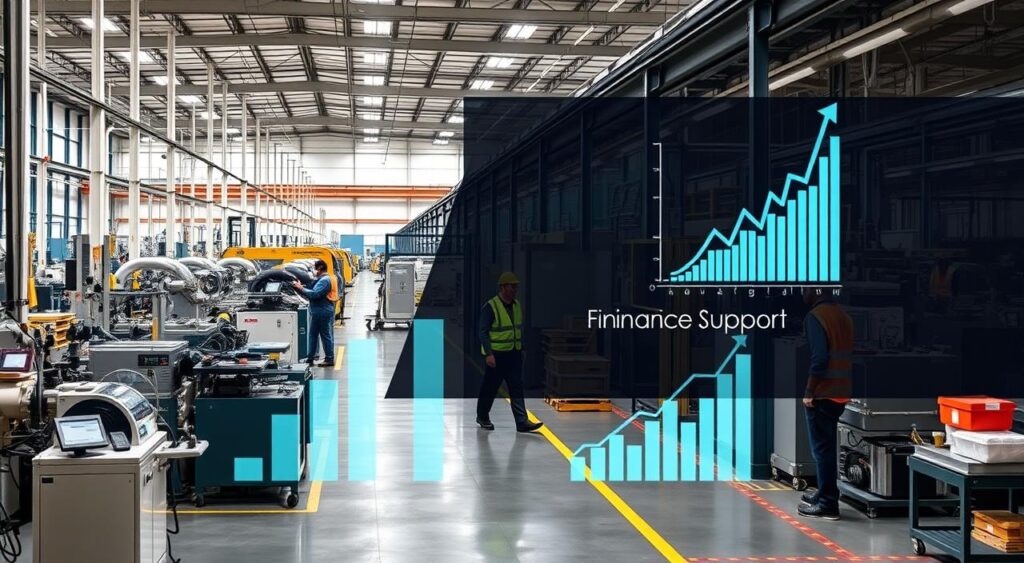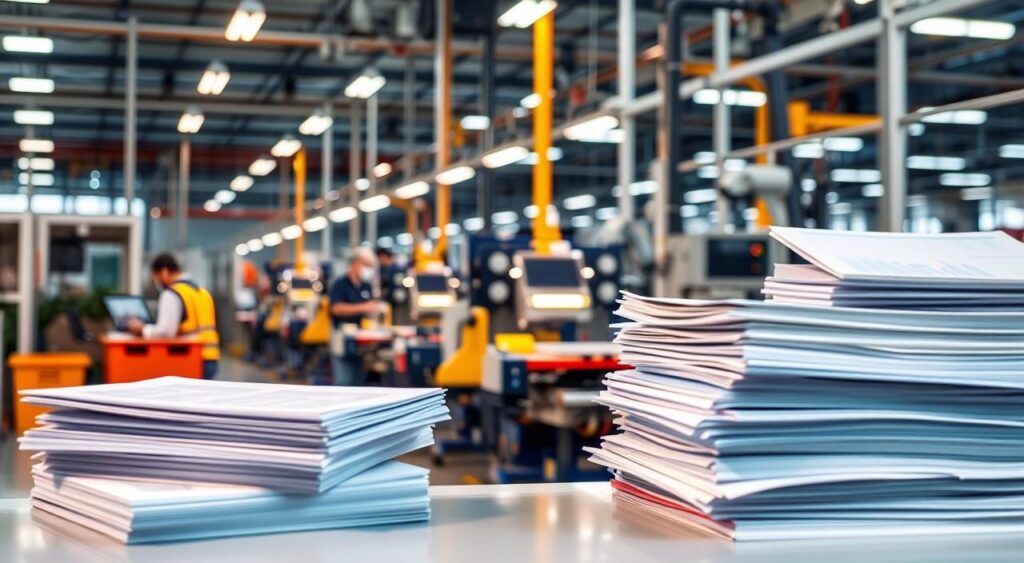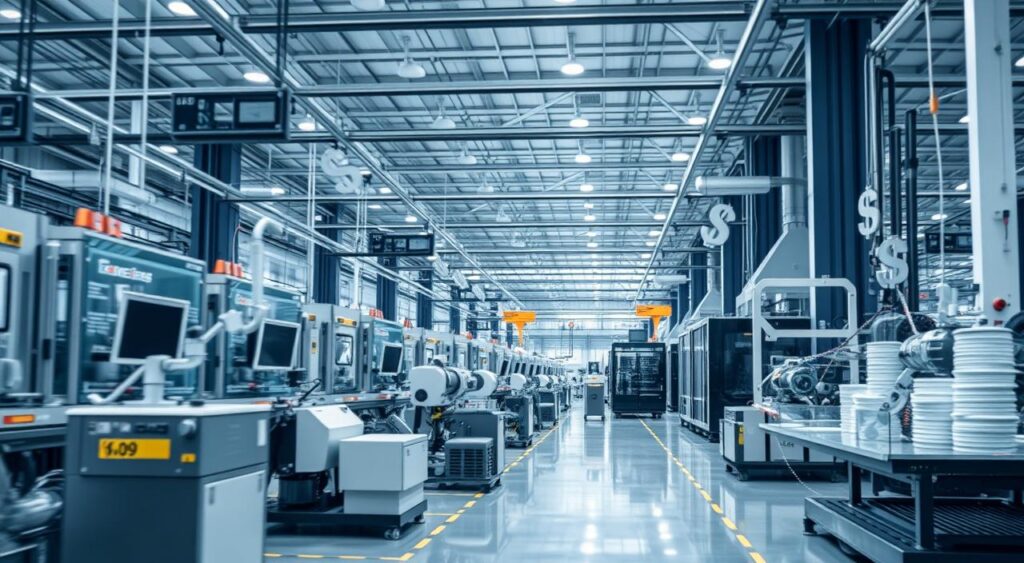In the fast-paced world of manufacturing, getting the right funding is key. It helps businesses buy new equipment, cover costs, and grow. Finding the right financing can seem overwhelming. But don’t worry, we’ll look at the top options to boost your manufacturing success.
What are the most affordable and flexible financing choices for manufacturers today? Dive into this detailed guide to find the ways to drive your business ahead.
Key Takeaways
- Explore the advantages and disadvantages of various manufacturing financing options like SBA loans, term loans, business lines of credit, equipment financing, and invoice factoring.
- Understand the requirements, interest rates, and repayment terms for each financing solution to make an informed decision.
- Discover how to leverage government-backed SBA loans and alternative financing methods to meet your business’s unique capital needs.
- Learn how to optimize cash flow and modernize your manufacturing operations through innovative financing strategies.
- Gain insights into the latest trends and best practices in manufacturing finance to stay ahead of the competition.
Introduction to Manufacturing Business Loans
For manufacturing businesses, getting the right financing is key for growth and staying competitive. Manufacturing business loans are a flexible option. They provide the funds needed for various expenses like buying equipment, paying employees, and covering overhead costs.
What is a Manufacturing Business Loan?
A manufacturing business loan is designed for manufacturing companies. It can be used for many things. This includes buying new equipment, upgrading old machines, and covering daily expenses to help the business grow.
Advantages and Disadvantages of Manufacturing Loans
Manufacturing loans have many benefits. They often come with low interest rates, fixed monthly payments, and help in building business credit. But, there are also downsides. These include needing collateral, having to meet high credit score requirements, and interest rates that can change based on your qualifications.
In summary, manufacturing business loans can be a great help for companies looking to finance their operations, buy new equipment, or grow. Knowing the good and bad points helps manufacturers choose the best financing for their needs and future plans.
SBA Loans for Manufacturers
The Small Business Administration (SBA) has two main loan programs for manufacturers. These are the SBA 7(a) loan and the SBA 504 loan. They offer competitive terms, lower down payments, and flexible repayment plans. This makes them a great choice for funding various business needs.
SBA 7(a) Loans for Manufacturing Businesses
The SBA 7(a) loan program is very popular. It offers loan amounts from $500 to $5.5 million. These sba 7(a) loans can be used for many things like buying equipment, covering working capital, and even real estate.
Manufacturers like these loans because they have competitive rates and fees. They are often as good as non-guaranteed financing options.
SBA 504 Loans for Fixed Assets
For those looking to buy or renovate buildings, land, or long-term equipment, the SBA 504 loan is a good option. These sba 504 loans are fixed-rate and provided through Certified Development Companies. The SBA guarantees up to 50% of the loan.
This means manufacturers only need to put down 10% for the loan. It’s a great way to get the funding needed for sba manufacturing loans and government-backed financing for manufacturers.
Both SBA 7(a) and 504 loan programs offer unique benefits for manufacturers. By using these sba manufacturing loans, businesses can invest in equipment, expand facilities, and drive growth and innovation.
| Loan Program | Maximum Loan Amount | Down Payment Requirement | Primary Use |
|---|---|---|---|
| SBA 7(a) Loan | $500 to $5.5 million | Typically 10-20% | Working capital, equipment, real estate |
| SBA 504 Loan | Up to $5 million | 10% | Purchasing/renovating buildings, long-term equipment |

“SBA loans accounted for over 50% of Sunwest Bank’s total annual loan volume, making them a significant player in providing financing to manufacturers.”
Term Loans for Manufacturing Companies
Traditional term loans from banks and online lenders are great for manufacturing businesses. They offer a big sum of money to be paid back over a set time, usually 1 to 5 years. This money can help buy equipment, cover daily costs, or grow the business.
Term loans might ask for collateral and need a good credit score. But, they can have low interest rates and fixed monthly payments. Loan amounts range from $5,000 to $5 million, with interest rates between 2% and 20% APR. Repayment terms can last from 12 to 72 months.
To get a manufacturing business term loan, companies need to be in business for at least 3 months. They should make $10,000 a month and have a credit score of 450 or higher. Businesses with better credit scores can get better rates and terms.
Term loans are a good choice for manufacturing companies wanting to buy new equipment, cover costs, or grow. They can help with big orders or expanding facilities.

“Term loans provide manufacturing businesses with the capital they need to invest in new equipment, expand operations, and seize market opportunities.”
Manufacturing companies can also look into other financing options. These include SBA loans, business lines of credit, equipment financing, invoice factoring, and merchant cash advances. The best option depends on the business’s specific needs and goals.
Business Line of Credit for Cash Flow Needs
Manufacturing businesses often face ups and downs in cash flow. A business line of credit can be a great help. It lets you borrow money as you need it, up to a set limit. You only pay interest on what you borrow.
This makes it easier to handle changing expenses and inventory. It’s a flexible way to manage your finances.
Benefits of a Business Line of Credit
The main perks of a business line of credit for manufacturers are:
- Improved Cash Flow Management: Get funds when you need them for payroll, inventory, and more. No big upfront payment required.
- No Collateral Requirements: Many lines of credit don’t ask for collateral. This is good for businesses with few assets.
- Building Business Credit: Using a line of credit wisely can improve your business credit score.
Manufacturing companies can get lines of credit up to $250,000. You can get money fast, often in hours. Rates start at 1% simple interest per month. Terms last from 2 to 10 years, based on your credit and the lender’s.

A business line of credit is key for working capital financing and cash flow management. It gives you flexible access to funds. This helps manufacturers deal with their financial ups and downs better.
Equipment Financing for Machinery and Tools
For manufacturers, the right equipment is key for efficient work and staying ahead. Equipment financing offers a special way to get the tools and machinery needed. It uses the equipment as collateral, making it easier to get funds even with lower credit scores.
Equipment financing is great for upgrading or growing production. It lets manufacturers buy new tech and tools without using all their cash. This keeps their finances flexible and helps them grow.
When looking at equipment financing, there are several things to think about. Here are a few:
- Loan terms: Financing agreements last from 2 to 7 years, matching the equipment’s life.
- Interest rates: Rates for machinery financing start under 4%, but can go up based on credit score and more.
- Application process: Getting funded can be quick, sometimes in the same day or 48 hours.
- Credit requirements: Credit scores needed for equipment financing for manufacturers vary, but are usually around 500 to 650 or higher.
Understanding these options helps manufacturers find the best equipment financing for their growth and needs.
Invoice Factoring and Financing Solutions
Managing cash flow is tough for manufacturing businesses. Invoice factoring and financing offer new ways to get funds from unpaid customer invoices. These options give immediate cash, helping companies meet urgent needs and keep running smoothly.
How Invoice Factoring Works
Invoice factoring is a key financing choice for manufacturers. A factoring company buys the invoices at a lower price, giving the business cash upfront. They then collect payments from the customers. This boosts cash flow and avoids the stress of late payments.
Factoring beats bank loans in many ways for manufacturers:
- Quick access to funds – Businesses can get up to 100% of invoice value in days.
- Low factoring fees – Rates start at 0.25% for eligible businesses.
- Flexible financing – Companies choose which invoices to factor and when.
- No debt buildup – Factoring doesn’t add to the company’s debt.
Manufacturers can also look into invoice financing. It uses unpaid invoices as collateral for a loan. Both options help with cash flow and support growth.
| Factoring Provider | Funding Amounts | Factoring Fees | Funding Timelines |
|---|---|---|---|
| Viva Capital Funding | Up to 100% of invoice value | As low as 0.25% | Same day funding |
| Porter Capital | $300,000 to $4 million | As low as 0% | As fast as 0 hours |
Using invoice factoring and financing, manufacturers can better manage cash flow. This supports their growth plans and keeps costs under control.
“Factoring is a reliable alternative funding source that guarantees financial reliability for manufacturing businesses.”
Alternative Financing Options like Merchant Cash Advances
For manufacturers, there are other ways to get money besides bank loans. A merchant cash advance is one option. It gives a big payment upfront in exchange for a share of future sales or credit card payments. This can be a good choice for businesses that need money fast and don’t have much credit or collateral.
Other options like invoice factoring, peer-to-peer lending, and crowdfunding are also popular. They offer quick access to cash, which is great for urgent needs like paying employees or buying new stock. Unlike traditional loans, these options don’t take as long to get.
- Businesses can get cash quickly by converting unpaid invoices into cash or getting upfront funds based on future sales.
- Alternative financing helps manage cash flow, keeping businesses liquid during tough times.
- It also helps businesses stay strong and recover from setbacks, even when the economy is hard.
When looking at alternative financing, it’s important to compare things like interest rates, fees, and repayment terms. Also, check the lender’s reputation. Building good relationships with lenders can lead to better terms and easier access to money in the future.
| Lender | Estimated APR | Loan Amount | Credit Score Requirement | Funding Speed |
|---|---|---|---|---|
| Clarify Capital | As low as 5% | Up to $5 million | 500 | As fast as same day |
| Lendio | 3% to 60% | Up to $10 million for AR financing | 600 for a credit line | As fast as 48 hours |
| 1West | As low as 5% | Up to $10 million for AR financing | N/A | As fast as same day |
| SBG Funding | N/A | N/A | N/A | As fast as same day |
| Smarter Finance USA | 10% to 20% for equipment financing | $10,000 to $1 million for equipment financing | N/A | N/A |
Exploring alternative financing can help manufacturers get the money they need. This can be for new equipment, hiring more staff, or growing their business. It can make them stronger in the market.
best manufacturing financing options
Manufacturers have many options for best manufacturing financing. They can look at top financing options for manufacturers and optimal business loans for manufacturing. The goal is to find the right financing that fits their needs and goals.
Equipment financing is a popular choice. It covers 100% of the cost for manufacturing equipment. This includes installation, tax, and freight costs. With good rates and terms, it allows for financing up to $1 million for several pieces of equipment at once.
Recent tax changes, like Section 179 and bonus depreciation, make equipment financing even better for manufacturers.
| Financing Option | Loan Amount | Interest Rates | Repayment Terms |
|---|---|---|---|
| SBA 7(a) Loans | Up to $5 million | 5.5% to 9.75% | Up to 25 years |
| Business Lines of Credit | $2,000 to $250,000 | 10% to 99% | Revolving |
| Term Loans | $2,000 to $500,000 | 6% to 99% | Up to 5 years |
| Invoice Factoring | 85% to 95% of invoice value | Varies | Based on invoice terms |
Manufacturers can also look at other optimal business loans for manufacturing. This includes SBA loans, term loans, and business lines of credit. These options can help with operating expenses, inventory, and technology investments. They support long-term growth and success.
By carefully looking at their financing needs, manufacturers can find the right capital. This helps them thrive in a competitive industry.
Conclusion
Getting the right financing is key for any manufacturing business to grow. This article looked at many financing options. These include SBA loans, term loans, and more, to help with new equipment and cash flow.
Understanding each option’s pros and cons is important. This way, businesses can make smart choices. It helps them plan their financing well and grow in the long run.
Looking for funds for new equipment or to manage cash flow? There are many financing options for manufacturers. SBA-backed loans and term loans offer good rates and terms. Invoice factoring and merchant cash advances also provide flexible solutions for cash flow issues.
Choosing the right financing depends on knowing your business needs and goals. By looking at all options and matching them to your business, you can get the funds needed. This helps drive growth, improve efficiency, and stay competitive in the manufacturing world.
FAQ
What are the best financing options for manufacturing businesses?
For manufacturing businesses, the top choices are SBA loans, term loans, and business lines of credit. Equipment financing and invoice factoring are also good options. Each has its own benefits and requirements, so it’s important to pick the right one for your business.
What are the benefits of a manufacturing business loan?
Manufacturing business loans offer low interest rates and predictable payments. They also help build your business credit. But, they might need collateral, have high credit score requirements, and interest rates can vary.
What are the key differences between SBA 7(a) loans and SBA 504 loans for manufacturers?
SBA 7(a) loans are flexible for various business needs, like equipment and working capital. SBA 504 loans focus on land, buildings, and long-term equipment for manufacturers. Both have low interest rates and long repayment terms for qualified businesses.
How can term loans benefit manufacturing businesses?
Term loans give a lump sum for a fixed time, usually 1 to 5 years. They can fund equipment, operational costs, or expansion. They might need collateral and have high credit score needs, but offer competitive rates and regular payments.
What are the advantages of a business line of credit for manufacturers?
Business lines of credit offer better cash flow and no collateral. They help build credit. Unlike term loans, they let you use funds as needed, up to a limit, and only charge interest on what you borrow. This is great for managing expenses and inventory.
How can equipment financing benefit manufacturing operations?
Equipment financing helps buy or lease new machinery and tools. It uses the equipment as collateral, making it easier to get funds with lower credit scores. This is good for upgrading or expanding your facility.
What are the differences between invoice factoring and invoice financing for manufacturers?
Invoice factoring lets you sell outstanding invoices for cash at a discount. Invoice financing uses unpaid invoices as collateral for a loan. Both improve cash flow and meet short-term needs.
What is a merchant cash advance, and how can it benefit manufacturing businesses?
A merchant cash advance gives a lump sum for a percentage of future sales or credit card receipts. It’s costly but can be a quick fix for businesses with limited credit or collateral.

